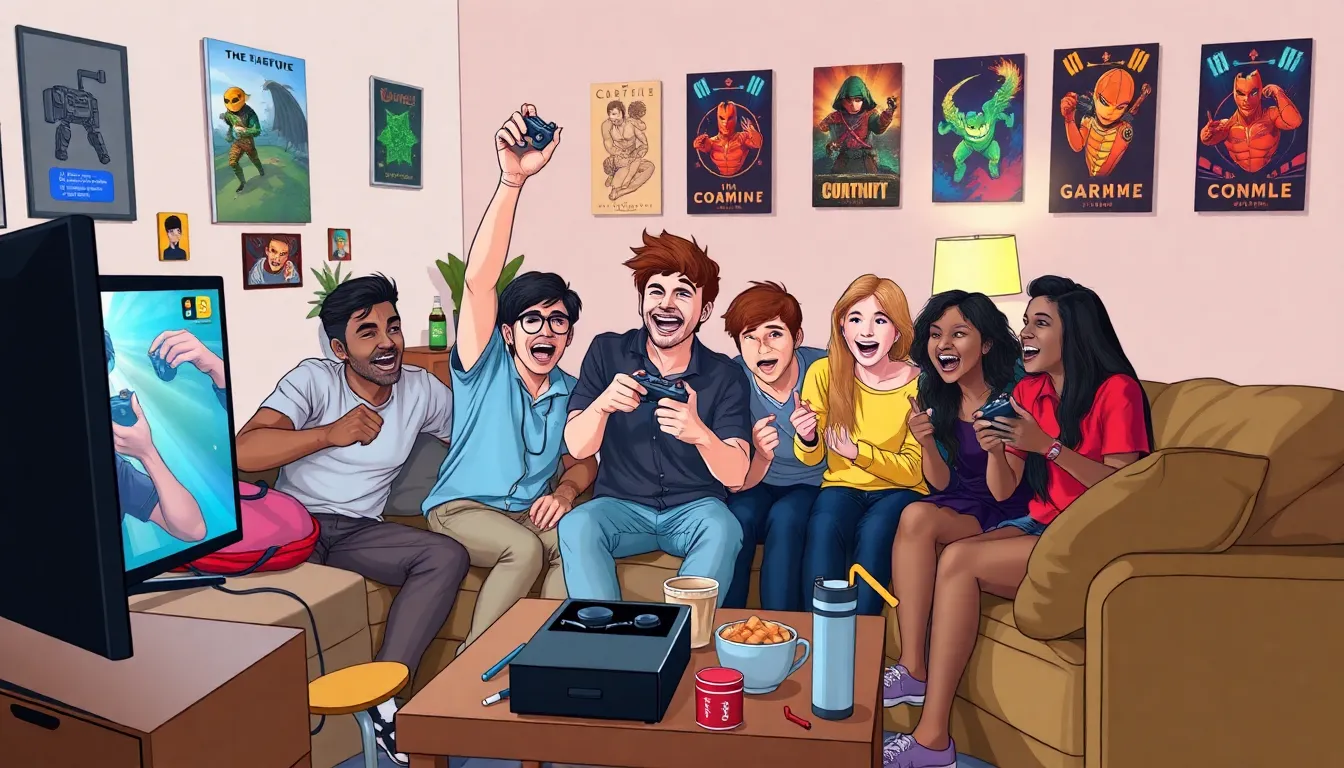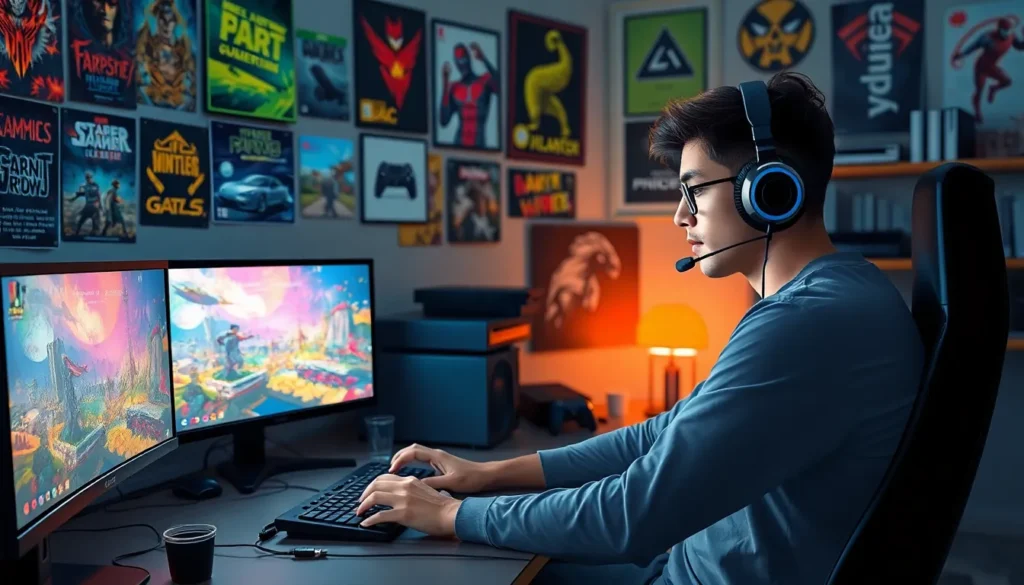In a world where leisure time is as precious as a rare loot drop, the debate over whether video games qualify as a hobby is more relevant than ever. Some folks argue that spending hours conquering virtual realms is just a time sink, while others see it as a vibrant community and a creative outlet. After all, who wouldn’t want to level up their skills and make new friends while battling dragons or racing cars?
Video games have evolved beyond mere entertainment; they’re a cultural phenomenon that brings people together. Whether it’s strategizing with friends on a multiplayer battlefield or getting lost in a captivating storyline, gaming offers a unique blend of challenge and fun. So, is it really just a pastime, or is it a legitimate hobby that deserves recognition? Let’s dive into the pixelated world and explore the arguments on both sides.
Is Video Games a Hobby
Hobbies encompass activities pursued for enjoyment and personal fulfillment during leisure time. Engaging in a hobby often provides relaxation and a sense of achievement. They can also offer opportunities for connection with others who share similar interests.
Different types of leisure activities fall under the hobby umbrella. These include crafting, reading, sports, and gaming. Video gaming stands out due to its interactive nature and evolving community aspects. Many individuals find that playing video games allows them to explore new worlds and challenge their skills.
Gaming connects people worldwide, creating a vibrant community. Online platforms enable interaction among players, fostering friendships and teamwork. Shared experiences in gaming can generate a strong sense of belonging and camaraderie.
Many gamers report feeling a sense of accomplishment through in-game achievements. Skills such as strategic thinking and problem-solving often improve with regular gameplay. Video gaming provides an outlet for creativity, as players express themselves through character customization and in-game choices.
The debate revolves around whether gaming qualifies as a hobby. Critics argue that excessive gaming leads to negative consequences, such as isolation and reduced physical activity. Supporters point to the social and mental benefits, emphasizing the cultural impact of gaming.
Research supports the notion that hobbies improve mental health by providing stress relief. Participating in hobbies often leads to enhanced mood and better overall well-being. As society becomes increasingly digital, hobbies like gaming may hold significant cultural relevance.
The Nature of Video Games

Video games encompass a broad range of formats and experiences, contributing to their classification as a hobby. Their interactive nature invites players into immersive environments.
Types of Video Games
Action games offer fast-paced excitement. Role-playing games allow players to engage in storytelling and character development. Strategy games challenge players to think critically while managing resources. Simulation games replicate real-world activities, providing unique experiences. Each game type appeals to different interests, fostering personal enjoyment and engagement.
The Social Aspect
Gaming communities thrive on collaboration and interaction. Many players form friendships through online platforms. Cooperative gameplay encourages teamwork, enhancing social bonds. Competitive gaming fosters camaraderie, as players share experiences and strategies. Additionally, events and conventions bring gamers together, creating opportunities for networking and shared passion. Consequently, the social dynamics of gaming contribute significantly to its status as a hobby.
Benefits of Video Gaming as a Hobby
Video gaming provides numerous benefits that support its classification as a legitimate hobby. Engaging in gaming can foster cognitive growth, enhance relaxation, and improve social connections.
Cognitive Skills Development
Playing video games sharpens cognitive skills. Gamers frequently improve their strategic thinking as they navigate complex scenarios and make quick decisions. Problem-solving becomes second nature when they tackle challenging puzzles or compete against skilled opponents. Additionally, many games require players to analyze various outcomes, enhancing analytical abilities. Research by the American Psychological Association indicates that action games can boost visual attention and spatial awareness. As players practice these skills, they gain confidence that often translates into real-life scenarios, fostering greater problem-solving prowess in everyday situations.
Stress Relief and Relaxation
Video games also serve as an effective stress relief tool. Immersion in virtual worlds allows players to escape daily pressures and unwind. Many find the interactive experiences soothing, helping them disconnect from their busy lives. Engaging in gaming can trigger the release of endorphins, which improve mood and reduce anxiety. A study published in the Journal of Cyberpsychology found that participants reported decreased stress levels after short gaming sessions. These benefits contribute to overall well-being, demonstrating how video gaming can generate enjoyment and relaxation in a person’s leisure time.
The Controversy Surrounding Gaming
The debate over video games as a legitimate hobby includes various concerns. Critics often highlight addiction as a significant issue associated with gaming.
Addiction Concerns
Addiction can manifest in various forms, leading some individuals to prioritize gaming over responsibilities. Many professionals classify gaming disorder as a mental health condition, according to the World Health Organization. Some players experience difficulties in moderating their gaming time, which can result in negative impacts on personal relationships and work performance. Increased screen time often replaces physical activity, contributing to health issues. Statistics from the American Psychological Association indicate that a small percentage of gamers develop problematic habits. Shifting focus towards moderation can help players maintain a healthier balance.
Time Management Issues
Time management emerges as another critical factor in the gaming debate. Players often lose track of time while immersed in gameplay. Research shows that excessive gaming can lead to poor academic or professional performance. Individuals may struggle to juggle gaming with other obligations, causing stress and anxiety. Setting boundaries around gaming sessions can help mitigate these challenges. Some gamers employ strategies like time limits or scheduled breaks to maintain productivity. While gaming provides enjoyment, prioritizing responsibilities remains essential for a balanced life.
Comparison with Traditional Hobbies
Video gaming shares similarities with traditional hobbies, yet it also exhibits unique characteristics. Like hobbies such as knitting, painting, or gardening, gaming provides enjoyment and personal fulfillment. Engaging in video games offers relaxation, akin to how one might unwind while reading a book or watching a film. Social interactions often occur through cooperative play or competitive matches, drawing parallels to team sports or club activities.
Traditional hobbies promote personal skills, and video gaming enhances cognitive abilities like strategic thinking and problem-solving. Action and role-playing games challenge players to adapt and think critically, much like puzzles or board games do. Group gatherings around these hobbies often generate camaraderie, similar to how gaming events and conventions build a sense of community among players.
While traditional hobbies may foster physical activity, gaming stimulates mental engagement. The physicality of sports contrasts with the immersive experience provided by gaming. Immersion allows players to escape daily stresses, addressing needs for relaxation and entertainment.
Potential drawbacks associated with gaming include concerns about addiction and time management, common issues found in other hobbies. Some individuals may prioritize gaming, detracting from responsibilities, much as one might neglect chores for a captivating series or novel. The World Health Organization recognizes gaming disorder, highlighting risks warranting discussion.
Ultimately, the essence of hobbies lies in their ability to provide fulfillment and connection. Video gaming has evolved as a legitimate hobby, encapsulating emotional, social, and cognitive benefits. Acknowledging these aspects promotes a balanced perspective, recognizing both advantages and challenges tied to gaming in the broader hobby landscape.
Conclusion
Video gaming stands as a multifaceted hobby that enriches lives in various ways. It fosters social connections through collaborative gameplay and offers mental stimulation that enhances cognitive skills. While challenges like addiction and time management exist, they’re not unique to gaming and can be managed effectively.
The cultural impact of video games is undeniable, providing a platform for creativity and community engagement. As society continues to embrace digital experiences, video gaming will likely maintain its status as a legitimate and rewarding hobby, contributing positively to emotional and social well-being.

